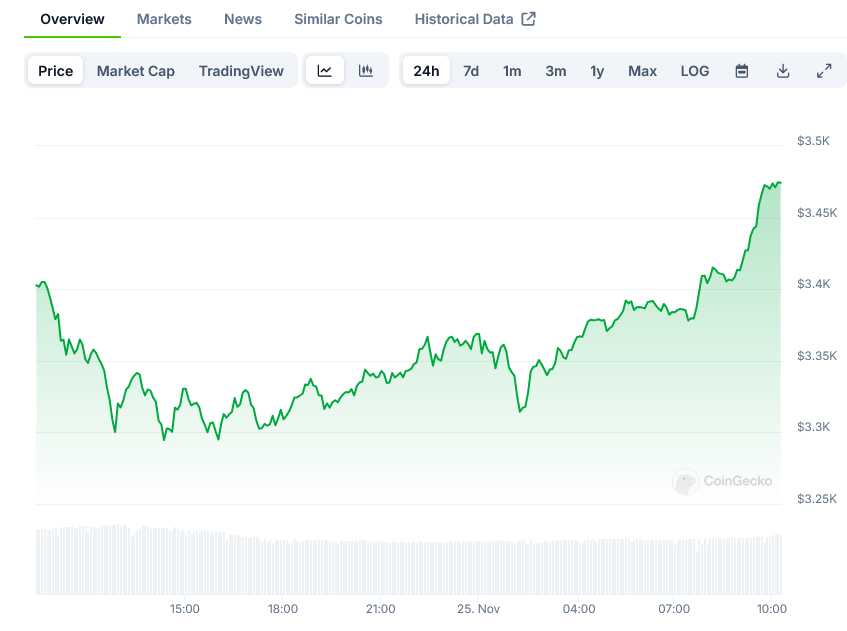Unique Web3 tech primed to democratize Internet of Things industry
W3bstream, a MachineFi project, is using Web3 technology to decentralize the Internet of Things.
We live in houses that are capable of monitoring and controlling a wide range of internal processes — from heating and cooling to security and surveillance mechanisms. Our cars keep track of external conditions and are well on their way to driving themselves. Our phones are constantly gathering valuable data and recording our activities — both on our devices and in real life.
Smart homes, smart cars, smartphones — all of these and much more are part of the rapidly expanding Internet of Things (IoT), which serves as the foundation of the machine economy. The IoT is what connects all of our smart devices and machines, and while the industry has produced remarkable achievements that have improved lives around the world, it is also an industry that has been centralized for decades.
That centralization has left smart device users with little control over their personal data. W3bstream, a leading project in MachineFi — the decentralized machine economy — has the potential to challenge the current IoT monopoly, benefitting billions of smart device users worldwide.
The booming IoT industry
Mckinsey predicts the IoT is on pace to add anywhere from $5.5 to $12.6 trillion to the global economy by 2030. A huge chunk of that growth is attributed to IoT solutions in the retail, home and health sectors. There are many potential benefits to enhanced connectivity among our devices and the things we interact with, from health and safety improvements to time-saving advantages.
However, for all of the promise of the IoT, the proliferation of smart objects and the increasingly important role they play in our lives is raising significant questions tied to privacy concerns and the dangers of concentrated power.
One of the reasons that the IoT industry has proven to be so profitable is the increasing value of consumer data. While the IoT has brought improvements to human safety, longevity and quality of life, there are also downsides due to the sacrifices that come at the price of convenience. The privacy debate has been roiling for some time now in the tech sector, as a number of companies have gone to great lengths to acquire user data. The intrusiveness of these companies and the subsequent liberties they have taken in profiting off of the data they collect has drawn the ire of consumers across the world.
Despite the concerns that many share regarding privacy overreach, given how thoroughly embedded into our lives services provided by companies like Google and Amazon are, there has been a general sense that little can be done to change the tide and give users control over their data. However, there is an alternative approach to IoT development that has the potential to recalibrate the industry’s power dynamics.
W3bstream and the fight for the future of the IoT
MachineFi Lab, the core developer of the IoTeX Network — a project that is working to merge blockchain technology with the IoT — has recently announced the rollout of a new product called W3bstream. W3bstream is a chain-agnostic system that has been developed to disrupt the monopoly that has been formed around user data and smart devices.
The project has taken a leading role in the nascent MachineFi industry, which has emerged as more efforts are being made to decentralize the machine economy. Key to MachineFi is infusing the principles of Web3 into the IoT, so that users will be able to maintain control over their data and protect their privacy, while still enjoying the benefits of the vast interconnected network of devices and services.
Beyond just protecting the end user, W3bstream will give users the option to profit from their own data, reshaping the current state of the industry. The key to being able to do this is the platform’s decentralized approach, which takes the ownership possibilities opened up by blockchain technology and applies it to the full spectrum of the IoT.
The strong technological underpinnings of the platform allow it to penetrate into all industries that use and create smart devices. The full range of devices that can operate on W3bstream include sensors, smart TVs, smart homes, self-driving automobiles and even smart cities. Via the platform, Web3 tech can be implemented by connectivity services, supply chain operators, healthcare providers, manufacturing companies and environmental protection agencies, among many others.
The benefits without the compromises
The incentive to introduce Web3 paradigms to these sectors lies in the benefits it will bring to billions of people. Just like in the current iteration of the IoT, people will be able to use their devices to monitor and improve key activities and aspects of their lives. However, in the Web3 model, people also stand to get rewarded for participating in the collection of data, all while being able to maintain their privacy.
The way this works is through data pools to which participants can contribute without having to reveal their names or any other information they wish to remain private. In the health sector, this could greatly advance research efforts without participants having to cede unnecessary personal information to third parties that may use the information to profit. Instead, the process would be much more democratic and streamlined to focus on scientific advancement and communal benefit rather than perpetuating revenue flows for corporations that have accumulated sprawling control over various facets of modern life.
In addition to the advantages this kind of platform presents for end users, W3bstream is also remarkable for the ease it has introduced into the process of application building. MachineFi Lab’s one-of-a-kind data compute infrastructure enables developers, smart device makers, and businesses to build Web3 applications in less than 50% of the time — and at half the price — it takes to build similar applications with other comparable software.
Currently, there are about 42 billion smart devices in use around the world. As substantial a figure as that is, this is still just the beginning of the machine economy; by 2025, people will own about 75 billion smart devices and machines. The more developed this industry becomes, the more difficult it is going to be to make substantial changes. W3bstream and other MachineFi projects are trying to lay the foundation for a democratized IoT now while it is still possible.






